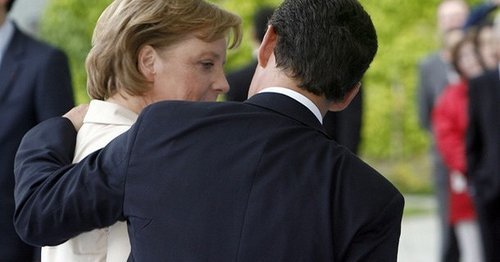At the meeting in the German chancellery, Merkel and Sarkozy planned not only the Brussels summit but also the upcoming G20 meeting in Toronto. During the meeting it was decided that both the countries promote in the EU a common Economic government of all the 27 member states – even if Merkel speaks only about “a kind of Economic government”.
Sarkozy suggested launching an economic government for the sixteen countries of the Eurozone...
Sarkozy suggested launching an economic government for the sixteen countries of the Eurozone institutionalised with the help of its own secretary. Merkel rejected this proposal because she is worried that it could ultimately split the EU. It was fixed however, that at least when there is a strong need for action the leaders of the 16 countries of the Eurozone gather at special meetings in order to agree upon guidelines specific for the situation.
During the last weeks and months there had been tensions between the countries: Germany proposed plans to fight the economic and financial crisis without consulting with France and the latter did full-body announcements in the media. Yet, there are good signals for an improvement of the relations. Sarkozy explains his position with regards of the actual direction of an economic government of the EU: “We will pragmatically find a solution for it and stop having theological debates that do not lead anywhere”.
To bring the European Stability and Growth pact back on track, both sides agreed that the well-known countries which frequently violate the deficit parameters can be deprived of their right to vote. According to which legal basis this should be done – with or without changes in the treaties – has still to be pragmatically determined.
In the perspective of the G20 summit it was decided that Germany and France are jointly committed for a tax of the financial market and its transactions. Merkel normally does not like pathetic statements but this time she explained that the harmony that France and Germany are enjoying again is a signal “that the world needs”. Sarkozy proclaimed: “once again we have shown that Germany and France share a common vision”.
The austerity plan of France was punctually made public for the meeting. France wants to save a total of 100 billion Euro by 2013 through cutbacks of the expenditures and of the tax allowance as well as tax increases. [1] The objective of these measures is to reduce the budget deficit from 8% to 3% of GDP in order to revive the economy. The Commission demanded more detailed explanations about the strategic measures for the consolidation of the French budget. According to the documentation available today 35 billion Euro will be injected into the state’s finances. Virtually an economic miracle will thus be necessary.



1. On 16 July 2010 at 11:00, by Convicted European Replying to: Angela and Nicolas Share a Common Vision Again
Replying to: Angela and Nicolas Share a Common Vision Again
Danke / Thanks for the overview of this topic and for sharing your ideas. Personally I think that the EU and the European integration is and should be much more than the Franco-German motor. Even though it’s a great achievement that these two old foes are linked together in several ways and cooperate rather than oppose each other many of their agreements are foul and not necessarily beneficial for the Union as a whole. It’s a fact that Germany is bigger and more important than France on its own standing and should thus have no fear in pursuing to agree on things with other like-minded member states when it comes to austerity plans, fiscal discipline and similar as long as it does so in its traditionally pro-European minded manner. However, by being linked to France all these years it seems as if Germany picked up a few tricks on how to defend your national interest, something France has been a champion of within the EU. I’m not convinced that Angela and Nicolas share a truly common vision nor do I believe that they should.
PS. I very much like the links to other articles on the topic;-)
Follow the comments: |
|
